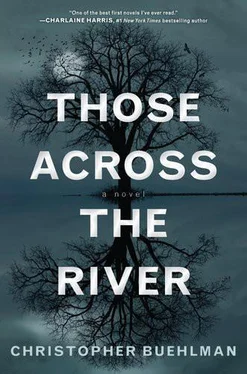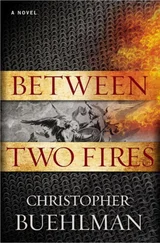She did not use any new arguments; the idea that the money saved from the Chase would help to ease at least a few of Whitbrow’s troubles had been addressed before. She did offer one new proposal, though.
“Why not fashion pigs out of straw or branches and decorate them? Perhaps the labor would be sacrifice enough. Ursula and the others could still weave flowers through them. And they could be carried out to the same place. I don’t know. I’m not as religious as I perhaps should be. And I’m not from here, as you all know. But I care about what happens here, and I hope you’ll agree with me that the money from the collections might do better buying clothes or paying bank notes for those who are struggling instead of reimbursing farmers for wasted animals.”
She got considerable applause.
Gordeau called out, “I’m sorry I called you a carpetbagger!”
“Mr. Gordeau, when did you call me that?” she said.
“Not to your face, ma’am.”
When she was done and she walked away from the podium, some looked back at me where I was beaming at her from my spot against the wall. Some looked at Pastor Lyndon to see if he was looking unfavorably upon her, but he was not.
When Paul called the end of the meeting and those of us who were inside went out and mingled with those who were outside, we all got treated to one more spectacle.
Martin Cranmer was on his bicycle. He rode around the town square fast like a little boy, and he howled. He did not howl loud enough for anyone to fuss at him about the noise, but he howled low so that when he circled near the town hall everyone heard plainly what he was doing. The ones nearest the road watched him as if he were a stuntman or an acrobat doing a trick, so he did a trick. He put one foot on the seat and stood with the other foot held up high behind him, steering shakily and grinning at them through his beard.
“That man’s three sheets to the wind,” a woman said, and, as if he had been prompted, Martin hit a stone and fell, slowly and luxuriously, the way hard drinkers fall even in accidents involving machines.
Lester Gordeau’s younger brother Saul ran to help the taxidermist up and the sheriff came over, too, and talked quietly to him so that he nodded his head and pedaled off gently.
“He’s alright,” Sheriff Blake said. “Nothing hurt but his liver. Let’s all go home now.”
And that was what they did, each to his own home.
And I believe none slept well that night, and none remembered any good dream.
THE ALDERMEN HELD their vote the next night, deciding six against three that no more pigs should be herded into the woods. This was the same margin by which the advocates of the Chase had won two years before when the same issue had come up following the slaughter of piglets for the Hog Reduction Program. The decision was read and entered into the minutes at 8:15. Lawton Butler, whose pigs were next on the registry and due for surrender in the coming weeks, reportedly got up out of his seat and raised his hands to the ceiling as if he were about to be baptized.
Eudora went to this meeting without me.
I had begged off so I could work, but what really happened was that I sat in front of the typewriter and nursed three glasses of Drambuie.
Dora said not many came at all.
ALL THE DRAMA and the most compelling speakers had gone the night before; besides which, it had been widely believed that the ceremony would not survive a second vote, so few were surprised when the decision was entered.
What did surprise the community was the death of Paul Miller, alderman and owner of the general store.
It surprised Paul, too.
The pain hit him while he was standing on a stepladder to stack flour on a high shelf. It shocked him so that he stepped off the ladder wrong and cracked his head, dropping a sack of flour, which burst all over him and the floor. This happened early in the morning two days after the vote.
Dr. McElroy, an old-time black-bag doctor who kept his office in the back of his house, was the only one who was not surprised.
He filled us in at the general store.
Why was I hanging around there? Why wasn’t I at the typewriter? Because I had to go into those woods next, that’s why.
Where are your pants, my friend?
“I told him his heart was not bad insofar as I heard no murmurs or irregular beats, but that his restin heart rate was high, and he didn’t need an MD to tell him he was carryin too much. I told him he had a clean bill of health so long as he’d promise to lay off the fat meat, cut his portions and start takin walks. He only heard what he wanted to hear. Like most of us, I reckon. Maggie Whaley found him all white with flour on his floor, an she came runnin for me. I told her he was dead when he hit the floor and she couldn’t of done a thing; truth is, he was probably still tickin, but that’s the kind a thing you say. Either way, he was all done when I listened to that big chest of his. No more prime rib for you, old man. It’s a sorry damn shame is what it is.”
Paul Miller was buried in a very large box. His funeral was well attended despite the rains that came on the tail end of a hurricane that had given hell to the Florida Keys. People strained to hear the pastor’s words in the wind.
Some of those hunching under newspapers or shared coats owed him money. Of these, I’ll bet some wondered if the list of debtors would be found by his wife, and struggled with whether or not to tell her. I was sorry that his big, generous face would no longer loom behind the pickle jar, and that he would be crushing no more hands with his aggressive handshakes. Many of the others were sorry, too, that his listless, rail-thin brother would likely take over the store, at least until he found out how much work it was.
The rain was heavy and warm and made small lakes on the potted road that led back from the churchyard. What we all felt that day, even those of us who were new in town, was that something had changed in Whitbrow, something had given way, and what would follow would not be to our liking.
EUDORA STARTED TEACHING school the Tuesday after Labor Day weekend, in the simple building on the outskirts of town that served as a high school. It had a tin roof, a potbellied stove, dirty windows and a sextet of rough-hewn tables with a few benches and mismatched chairs. The boys and girls shared pencils since ink for the pens had run out.
She saw right away that her biggest challenge was going to be keeping these grown-up-looking farmers’ kids in school. She expected to lose a few temporarily, maybe permanently, during the corn harvest that would follow soon. A girl like Ursie would pose little risk; she was not needed at her father’s businesses, nor in his peach or nut orchards where hired men worked the ladders. All she had to do was mind her younger sibling and do light chores at night while her mama cooked.
Sarah Woodruff, on the other hand, wore her older brother’s cast-off pants cinched around her waist with a leather strap, and her shoes had the backs cut off and the tops slit because she had long since outgrown them. Sarah was fifteen and fighting a losing battle with her parents to stay in school instead of helping them full-time with the farm. What good would numbers and letters do her when she was a wife? What could she want besides that? Her good looks had already caught Saul Gordeau’s eye; more than his eye, his daddy seemed to think. This could have just been wishful thinking on the old man’s part; the girl was more than just beautiful. She was positively wholesome . Pinup girl material, with her bright eyes and her chestnut hair and just that little bit of freckle.
Of course, Dora didn’t care about that. She loved Sarah because Sarah paid attention. She understood. None of the boys could keep up with her at reading or math, but one of them was going to be her lord and master soon; if not Saul, then maybe the squarish boy who sat up front and talked about going in the army. One of them would take her by her pretty hair and drag her into his house to make her peel things and wash things and mend things under his mother’s gaze. Eudora told me it would be her chief mission to keep that girl in school, whatever became of the rest of them.
Читать дальше












